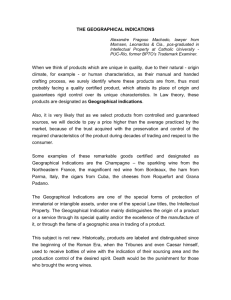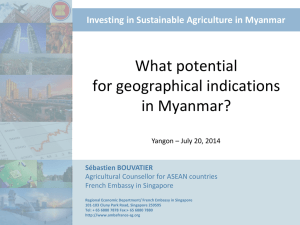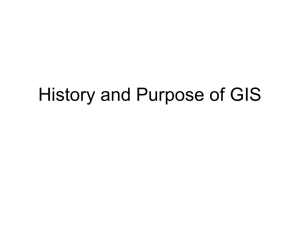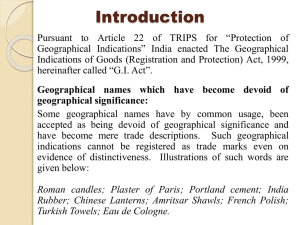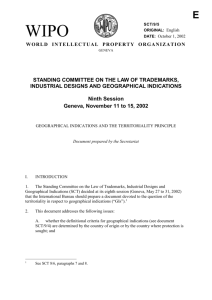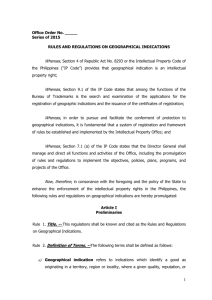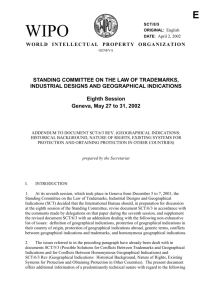The Protection of Geographical Indications in Brazil
advertisement
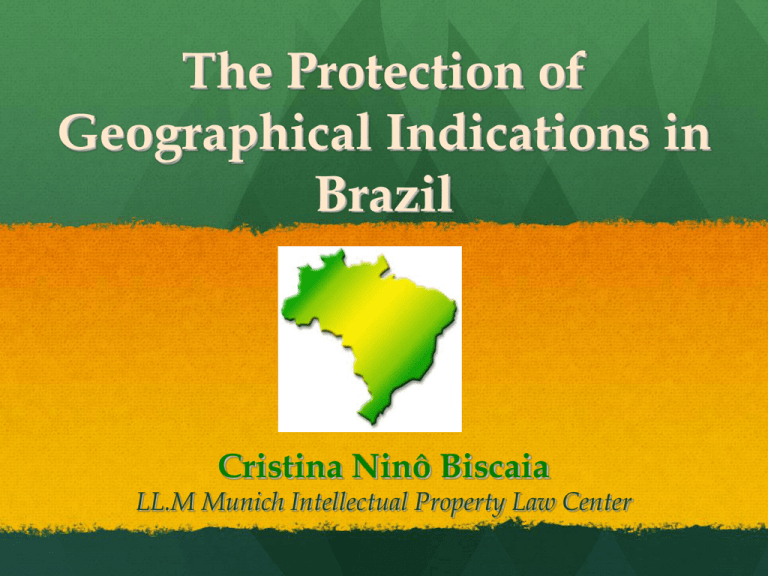
The Protection of Geographical Indications in Brazil Cristina Ninô Biscaia LL.M Munich Intellectual Property Law Center Treaties Protecting GIs in Brazil Paris Convention (1883) Madrid Agreement (1891) Lisbon Agreement (1958) TRIPs Agreement (1994) Comparative View – US The United States’ GI system uses administrative trademark structures already in place. The same governmental authority (the United States Patent and Trademark Office or "USPTO") processes applications for both trademarks and GIs. The United States do not protect geographic terms or signs that are generic for goods/services. Comparative view – Italy (EU) Central to the Italian strategy are GIs protected labels, including Protected Designation of Origin (DOP), Protected Geographical Indication (IGP), and Traditional Specialty Guaranteed (STG) that tie a product to its territory of origin, signaling its authenticity to consumers. Types of GIs in Brazil Generic Geographical Indication Indication of source Appellation of Origin Industrial Property Law - BR Article 176 – A geographical indication is constituted by an indication of source or an appellation of origin Article 177 – An indication of source is considered to be the geographical name of a country, city, region or locality of its territory, which has become known as Centre of extraction, production or manufacture of a determined product or for providing a determined service. Article 178 – An appellation of origin is considered to be the geographical name of a country, city, region or locality of its territory, which designates a product or service, the qualities or characteristics of which are exclusively or essentially due to GI vs Trademark The term CACHAÇA, has been asked as trademark in several countries in the world, same as what has been happening with the exotic fruits from Northern Brazil, CUPUAÇU and AÇAÍ; For this reason, it was imperative to protect the term CACHAÇA, in the field of Geographical Indications, taking into account the increasing worldwide exportation of the genuine Brazilian spirit. CACHAÇA – 2002 The first Brazilian geographical indication was published by a Decree 4.072, signed by the Brazilian Government in the year of 2002; Certification before the BR Patent and Trademark Office Except for the CACHAÇA, all the Geographical Indications were granted by the Brazilian Patent and Trademark Office – BPTO Since 1999, the BPTO analyzed Geographical Indication applications 75 GIs Requirements in Brazil Regulation of the geographical indication term Official instrument delimitating the geographic area Description of the products and services Characteristics of the products and services Labels of the graphic and figurative geographical indications A controlling structure of the producers which are going to use the geographical indication GIs application before the BPTO Application file Documents analysis Application published Period of 60 days for oppositions Final analysis GIs granted by the BPTO WINE – 2002 COFFEE – 2005 GIs granted by the BPTO Beef – 2006 Cachaça - 2006 GI certified by the BPTO Leather – 2009 Wine – 2009 GI Certified by the BPTO Until the present date, the BPTO granted 40 Geographical Indications 33 Brazilian 02 Italian 02 French 02 Portuguese 01 American Italian Gis Granted in Brazil ITALY - 2ND POSITION SAN DANIELE CONSORZIO DEL PROSCIUNTO DI SAN DANIELE April, 04, 2009 – IG 980003 Italian GIs granted in Brazil FRANCIACORTA CONSORCIO PER LA TUTELA DEL FRANCIACORTA October, 21, 2003 – IG 200101 Italian GIs pending in BPTO PARMIGIANO REGGIANO – CONSORZIO DEL FORMAGGIO PARMIGIANO-REGGIANO Comply with Request – December, 27, 2011 BAROLO – CONSORCIO DI TUTELA BAROLO BARBARESCO ALBA LANGHE E ROERO – Comply with Request, September 21, 2010 BARBARESCO – CONSORCIO DI TUTELA BAROLO BARBARESCO ALBA LANGHE E ROERO – Comply with Request, September 21, 2010 Italian GIs pending in BPTO PARMA – CONSORZIO DEL PROSCIUTTO DI PARMA – Request of Reconsideration – August, 18, 2009 PADANA – CONSORZIO PER LA TUTELA DEL FORMAGGIO GRANA PADANO – Published – June, 11, 2002 CONEGLIANO – CONSORCIO TUTELA VINO PROSECCO DI CONEGLIANO-VALDOBBIADENE Comply with Request – February, 09, 2010 Crimes against GIs – Brazil Article 192 Manufacturing, importing, exporting, selling, exhibiting or offering for sale or maintaining in stock a product that presents a false geographical indication. Crimes against GIs – Brazil Article 193 Using on a product, container, casing, belt, label, invoice, circular, poster or any other means of disclosure or advertisement, indicative terms, such as “type”, “species, “kind”, “system”, “substitute, “identical”, or the equivalent, without making clear the true source of the product. GIs Perspective in Bazil In Brazil, the GEOGRAPHICAL INDICATION expression is almost unknown to consumers and producers. Since 2005, the Agriculture Minister created a program to stimulate the recognition to the agriculture and cattle farming Geographical Indications. GIs Perspective in Brazil GI Perspective in Brazil Due to the relevant numbers of geographical indication files before the Brazilian Patent and Trademark Office – BPTO in the last decade, we assume that Brazil will be a considered as a strong and potential market to the geographical indications producers. A creation of a committee under the responsibility of the Agriculture Minister in order to stimulate the protection of new geographical indications and the national and international enforcement regarding the Brazilian geographical indications already granted. GRAZIE Cristina Biscaia cnbiscaia@gmail.com
